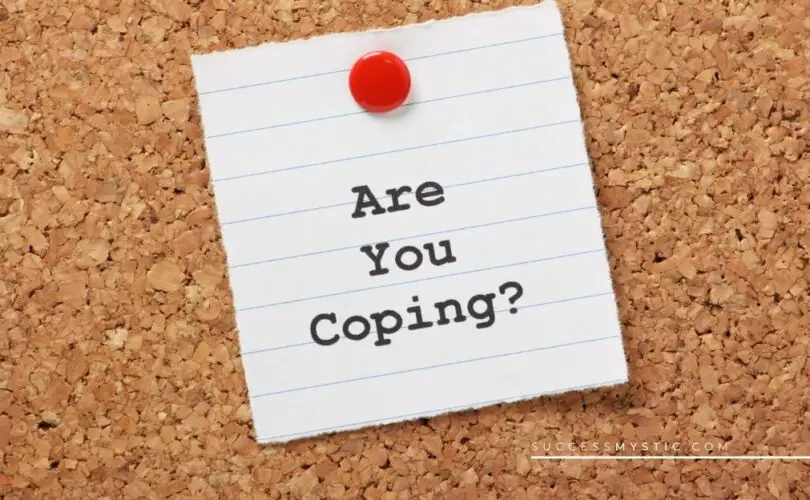Everyone has something with which they have to cope; part of reinventing and improving yourself, however, is finding healthy ways to do that. Whether you’re coping with stress, disappointments, or things in your life that are far outside of your control, you need to be using healthy copy mechanisms, so you aren’t doing any harm to yourself or others.
Finding healthy coping mechanisms that work for you is a challenge that shouldn’t be taken lightly. It’s also a process. It’ll take time before you can more easily see what coping mechanisms work well for you and what doesn’t.
We encourage you to take your time and be patient with yourself during this journey. Everyone is different when it comes to our daily struggles and what helps relieve us from them.
We intend to explore the process of removing unhealthy coping mechanisms and vices, developing healthy coping mechanisms, and how that helps your journey to reinvention.
Why Developing Healthy Coping Mechanisms Is Key For Reinventing Yourself
Our entire lives are a journey and we all have to grow and develop throughout the course of our lifetimes to become the best possible versions of us we can. Reinventing yourself is part of that process and ensuring that you’re doing everything in as healthy a manner as possible is another.
No matter who you are or what you do, there’s something with which you have to cope. Everyone finds their own ways to cope in life that gets them through those tough times. Unfortunately, many of us have developed unhealthy coping mechanisms which can be detrimental to you.
Utilizing unhealthy coping mechanisms and vices can cause you or those you love harm and often just numbs the problem, rather than doing anything constructive to rectify the issue.
Developing healthy coping mechanisms, however, can improve your overall quality of life and longevity. It’s an essential and integral part of the process of becoming a better person.
Identify The Problem
The first step in developing healthy coping mechanisms is identifying the thing with which you’re coping. This step is so important because it can help you work to rectify the problem, which is a healthier option than coping with it. It’s also important because it can help lead you to better and more effective healthy coping mechanisms when they’re required.
Once you’ve identified the issue, ask yourself why you feel you must cope with it. Analyze this as thoroughly and as deeply as you can; you may find that there’s a solution and you don’t need to cope at all. At the very least, it will help you identify a direction in which to go for coping mechanisms.
Next, ask yourself if there’s anything you can do to fix or rectify the problem. For instance, if you’re coping with where you’ve ended up in life, is there something you could change to make it better? A new job or career path, perhaps, or putting an end to a toxic relationship?
If you find that this is, in fact, something with which you simply must cope, your next step is to analyze how you’ve been coping so far. Are you dealing with things in a healthy manner or are you relying heavily on a vice to help you forget the problem?
The biggest tell for if your coping mechanisms are unhealthy is if the main reason you’re doing it is to forget or completely escape; things like drugs, alcohol, gambling, and other addictions tend to fall into this category.
Dealing With The Problems At Hand
Before you can develop healthy coping mechanisms that are effective, you must eliminate the unhealthy behaviors and actively deal with the problems that were causing them. Below, we’ve listed the most common problems people face that they feel they must cope with on a daily basis.
Career
Many people feel as though they have to cope with their career decisions and where it’s taken them.
If you experience the following, this may be your root problem with which you’re trying to cope: unhappy with your career as a whole, unhappy with how you do your job or how your company conducts business, underwhelmed or disappointed in the work environment and/or working conditions, lack of direction in your career or motivation to further it, or a lack of opportunity to advance.
Life
Another common problem with which people try to cope is their life and the decisions they’ve made. Everyone has certain expectations and goals they want to achieve in their lifetime and not achieving them can often make you feel like you have to cope with and become complacent with the life you’ve made for yourself so far.
If you are unhappy with where you are in life, what you’ve accomplished, the direction your life is going, don’t like yourself as a person, or are struggling heavily with past decisions and mistakes you’ve made, this could be one of your source problems.
Romance
It’s common to be unhappy or coping with where you are romantically in life. This section, unlike the others, frequently involves another person matching your efforts in order to change the situation.
If you feel like you are unhappy with your relationship or lack thereof, are guilty of sabotaging yourself in relationships, your relationships often feel like or currently feels like it’s not going anywhere, or you and your partners seem to fight constantly, this may be a problem area.
Friendships
Humans are social creatures that often need regular or semi-regular interaction with others in order to function fully and optimally. Friendships are another very common area of life with which people feel they must cope.
If you find yourself feeling excessively lonely often, always fighting with your friends, don’t like your friends in terms of behavior, your friends treat you poorly or vice versa, or your friendships seem to always be a one-way street where you’re doing all the work, this may be an area of your life with which you’re struggling.
Family
People often feel like they have to cope with their familial situations because you don’t get to choose your family; you’re just stuck with them.
If you find that you have poor family relationships, unresolved issues, are holding on to grudges or instances of hurt, are unhappy with where you are in terms of family (losing too many people, out of touch with people, struggling to start a family), or have lost several relationships that could have been repaired, this could be an area you tend to rely on coping mechanisms to handle.
Types Of Coping Mechanisms
Changingminds.org notes the following common coping mechanisms by type
Adaptive Mechanisms
Those which are positive and actually help
Attack Mechanisms
Those which project discomfort onto other people
Avoidance Mechanisms
These include methods of avoiding the problem at hand
Behavioral Mechanisms
These include things that change behavior
Cognitive Mechanisms
These include things that change thoughts
Conversion Mechanisms
These include things that change one thing into another
Defense Mechanisms
Rationalization, denial, and other types of Freudian ideas
Self-harm Mechanisms
Those which inflict self-harm
Harmful And Unhealthy Coping Mechanisms
Here are some common ways people cope in negative ways that do not really solve the problem at hand
- Acting Out – misbehaving, such as drinking too much or risky behaviors
- Avoidance – Avoiding the problem all together
- Emotionality – Emotional outbursts and extreme emotions
- Conversion – Subconsciously manifesting stress into physical ailments
- Idealization – Focusing and exaggerating the good parts of a problem, while ignoring the important issues
- Denial – The refusal to acknowledge or see a problem
- Fantasy – Escaping reality by creating an alternate one that does not exist
- Regression – Regressing to a childhood state in order to avoid problems
- Trivializing – Making light of serious situations
Identify Unhealthy Coping Mechanisms
Before you can develop healthy coping mechanisms, you must identify and put a stop to unhealthy behaviors.
Unhealthy coping mechanisms tend to be those with intent to drown out your problems, rather than cope with them.
These behaviors can include but aren’t limited to:
- Over-eating
- Under-eating
- Excessive drinking
- Illicit drug use
- Abuse of prescription drugs
- Excessive gambling
- Excessive shopping, etc.
- Taking your anger and frustration out on others
Unhealthy coping mechanisms can be summed up as those coping mechanisms that cause any kind of harm to you or those around you, be it emotional, physical, financial, or merely just creating concern.
Putting an end to these behaviors can often be difficult, especially when addiction rears its ugly head, but it’s necessary. Sometimes you can rid yourself of these behaviors by simply replacing them with more positive, healthy coping mechanisms.
However, if you’ve already succumbed to addiction, you may need a little more assistance in breaking free; there are many groups, counselors, and clinics available to provide assistance with these cases.
Developing Healthy Coping Mechanisms
While striving to resolve these issues is good, there are some things in life that you simply can’t fix with which you must cope. The trick is developing healthy and effective coping mechanisms to help you handle this, rather than relying on vices and other means of escape.
Finding What Works for You
Finding the right healthy coping mechanism that works for you can be a lot more difficult than it sounds. Coping mechanisms work differently for different people and different situations.
What’s effective for you, may not be in the slightest to someone else. We’re all different and are situations all have something unique about them, obviously, the same coping mechanisms aren’t going to be as effective for everyone.
It can take time to get in the rhythm of your new healthy coping mechanism and to notice any sort of results from it. You have to be patient with yourself and the process, giving it time to have a noticeable effect on you before you write it off.
For example, if the problem you’re coping with is entirely out of control, like the ability to start a family. Merely exercising likely won’t help you fully cope with the issue but writing or a combination of writing and meditation may produce better results.
It’s important to remember that some days the coping mechanisms you use may prove ineffective. We all have days that are harder than others, which could mean that you need to use a combination of healthy coping mechanisms.
As we all also are in different headspaces each day, a coping mechanism that works one day might not work the next. You must patient and flexible, willing to try new coping mechanisms until you find the one that works for that moment.
What To Expect Throughout This Process
The first thing you need to be ready for in the process of developing healthy coping mechanisms is that they won’t all work out the same each time you do them, they won’t all work for you, and what works for someone else may workout completely different for you. You must be flexible and patient to get through this process.
It will take time to be able to tell whether or not the coping mechanism is working for you. As we’ve already said, you have to be patient throughout this process; it’s very crucial and we can’t stress it enough. Give yourself time to get into the rhythm and into the routine of your new coping mechanisms before you judge their effectiveness.
If after you’ve given it a bit of time, you find it remains ineffective, you have to be open to the idea of changing it. You have to analyze what about it isn’t working. Is it the way you’re doing it or the coping mechanism itself?
For example, if writing fiction is your coping mechanism of choice and you find it ineffective, is it writing as a whole, or should you try writing non-fiction or poetry? You’re the only person who can possibly know the answer to this.
While it’s important to determine if you need to try a different method with your coping mechanism, it’s also crucial for you to let go of it when it proves to not be effective for you. If you spend too much time on a coping mechanism that’s simply not for you, you’re wasting valuable time and not doing anything to help you cope with the problem.
Don’t hold onto coping mechanisms that are useless to you and always remember, what works for others may not work for you. This means that you have to be flexible and open to new ideas and new methods. Don’t ever compare your journey to someone else’s.
Differences Between Healthy and Unhealthy Coping Mechanisms
There are a few tell-tale signs to help you determine if your coping mechanisms are healthy or unhealthy.
If your coping mechanism is causing you mental or physical health problems, it’s unhealthy and should be stopped. Examples of this type of unhealthy coping mechanisms would be the following: excessive drinking, excessive drug use, excessive exercising, physical violence, excessive shopping, gambling, etc.
If your coping mechanism negatively affects others, it’s likely an unhealthy coping mechanism. By negatively affecting others, we mean hurts them emotionally or physically or causes them problems of anything. The examples of these types of coping mechanisms are similar to the others listed above. If a coping mechanism causes you to behave poorly towards others or takes something away from others, it’s unhealthy.
If the coping mechanism does more harm for you than good, it’s unhealthy for you. This could even mean the subtle ways in which it can be harmful to you. For example, overeating can cause you to gain weight, worsen your health, and harm your self-confidence, though it may take longer to see those results.
Similarly, if your coping mechanism is to distract yourself from the problem, suppressing your feelings rather than dealing with them, you’re doing more harm to yourself in the long-run than good.
10 Healthy Coping Mechanisms For Every Day Life
Exercise
Physical activity is a great way to cope with many issues, but you can overdo it. Exercising keeps you focused and can lead to feelings of accomplishment as you push yourself harder to achieve new goals.
It also keeps you moving, allowing you to physically work out what’s going on and providing you with a kinetic meditation period. Exercising also releases endorphins which fill you with positive energy.
As we mentioned before, you can overdo it with exercising. It is possible to develop an addiction to exercising which may cause you to excessively exercise to an unhealthy point. Don’t push your body beyond its limits and don’t hurt yourself.
Writing
Oftentimes, we need to put things into perspective, work through them, and try to understand them. Writing often provides us with the opportunity to more clearly process the information or situations. It also provides you with the opportunity to view situations through a more objective lens.
Writing provides a medium of expression through which you can healthfully distract yourself while still working through the issue. Writing offers a unique opportunity to distance yourself from the situation through the use of fiction.
The magical thing about writing as a coping mechanism is there are many different methods to go about it. You can write poetry, short stories, fiction, non-fiction, prose, or even plays or music. This provides you with many different ways to change it up each day and find what works best for you as you go.
Writing also allows you the unique opportunity to distance yourself and distract yourself, while still working through the problem. You can pose the problem on someone else; you could imagine the worst case scenario and play it out in a story; you could enact your wildest imaginations. Anything is possible with writing.
Crying
Crying helps to release tension and emotions and helps process feelings. In the end it offers comfort to the sufferer.
Problem-solving
This process entails identifying and facing problem that is the root cause of stress and then developing an action plan to counteract or solve it, in an effort to manage it effectively.
Playing An Instrument Or Singing
Music provides us with both an escape and a way to work through our problems. It’s a creative form of expression that allows us to let out emotions and blow off steam. Like writing, it provides a creative outlet to work through what you’re trying to cope with so that you can stop coping and move on to accepting it.
Whether you’re writing music or interpreting and performing it, there are many different ways that you can express what’s on your mind through this process while also distancing yourself for protection, similar to writing. Music also has the performing aspect to it, which allows you the opportunity to interpret a piece and present your perception of it to the world.
Music can also help to lessen stress, calm the mind, and soothe the soul. Music is a powerful thing that can allow you to express your emotions and feel things you might not have known you could feel. It’s a powerful and valuable coping mechanism if you choose to pursue it.
Meditation
Meditation can be an extremely helpful and valuable healthy coping mechanism. It provides you with an opportunity for self-reflection, quiet alone time with yourself, and it provides you with a designated distraction-free time for relaxation. This helpful coping mechanism is one of the most helpful in terms of working through things and learning to accept them.
Meditation provides you with the opportunity for quiet self-reflection, which, in turn, provides you with countless benefits that can improve your daily life. For starters, meditation causes you to take stock of your day and your life so far. Through meditation, you force yourself to do nothing other than think, free from any distractions.
This reflection time also allows you to get better in-tune with yourself. It forces you to sit and reflect on yourself and truly focus on what’s going on with you physically, mentally, and emotionally. This allows you to be better in-tune with your body. It can also allow you to see warning signs, potential health risks, or just better identify when you need to take some time for yourself.
This time also provides you with the opportunity to analyze your behaviors and actions.
We often want to try to run away from this type of analysis, but it’s crucial to reinventing and improving yourself. This distraction-free self-reflection time can allow you to do just that. The longer you do this, the better and more objective you’ll become throughout this process.
Confiding In Someone You Trust
As we said before, humans are social creatures. For some people, it’s easier to spend time with others than spending time alone. Self-reflection is difficult, and some require an outsider’s perspective to gain any sort of objective view. Interacting socially with those for whom you care can offer several therapeutic benefits and provide you with a healthy coping mechanism.
For those that struggle with self-reflection, especially objective self-reflection, confiding in and discussing it with someone you trust that will be completely honest with you no matter what can prove to be more helpful than personal self-reflection.
This also gives you the opportunity to gain an outsider perspective to the situation which can help do two things: help you achieve objectivity and provide you with a perspective you may not have considered.
Get Help From A Professional
A licensed trained counselor offers a safe place to talk about your feelings, problem solve and can help you to create healthy coping mechanisms. This is a very healthy and positive way to deal with problems, especially the big ones.
Humor
Humor is a very healing thing. You can use humor to make light of stressful situations, which lessens their impact on your psyche and prevents overwhelm.
Relaxation
While this can be similar to meditation, relaxation practices can come in many different shapes and forms. Relaxing is an important step to diffusing stress, anger, or sadness. It’s one of the best healthy coping mechanisms available.
The best method of relaxation is whatever helps to truly calm you. If one method doesn’t work, try another; there’s a virtually endless list of options. From spa-level relaxation techniques like mud masks, bubble baths, steams, etc. to those you to with your hands like needlework (crochet, knitting, embroidery), coloring, video games, etc. to doing absolutely nothing, you can’t go wrong.
We’re all busy and full of stress; with so much vying for our attention we have to allow ourselves time to rest and relax. You can suffer from many health issues due to excessive stress, so take some time for yourself to relax each day.
In Summary
Developing healthy coping mechanisms is essential to your overall health and your reinvention process.
The journey to self-reinvention is a long and challenging one, but it’s well worth it. It can be hard to keep your motivation to finish out the journey successfully, but once you do, you’ll hopefully see a vast improvement and change in your personality that makes you truly happy and satisfied with yourself.
Health Benefits of Reinventing Yourself and Developing Healthier Coping Mechanisms
It can be difficult to stay motivated throughout this journey and this process, but not impossible. Keeping in mind the benefits we’ve come up with can help to keep you on track.
Working to improve yourself can help lessen your stress, weaken your temper, and provide you with an increased sense of calm. This can help prevent certain health conditions that prolonged excessive stress and anger can cause like stroke, heart attack, etc.
Reinventing yourself and developing healthier coping mechanisms can provide you with improved relationships, the ability to make better decisions, make you happier overall, and improve your overall quality of life. When done correctly, this journey will allow you to improve yourself in many ways that will contribute to a better quality of life overall.
It also provides you with several personal benefits of self-improvement. Developing healthier coping mechanisms and improving yourself like allowing you to be better in-tune with yourself, experience increased self-confidence, better self-awareness, a more objective outlook, and increased patience.
It can also help you to develop a better perspective, an improved direction in your career and life, and an improved outlook on life. This will allow you to make better decisions, have more of a focus, develop goals and achieve them, and have a more widened perspective.
We hope that you decide to embark on this journey to reinvention and self-improvement and that you see it through to the end. There are many stops along this journey; developing healthy coping mechanisms is just one step in the long overall process of self-improvement and reinvention.
No matter what specific goals you set up for yourself for this process of reinvention, keep your motivation and drive so you can see results from this journey and hard work; it’ll prove well worth it in the end.
Things To Keep In Mind Along Your Journey
Self-reinvention and self-improvement are positive and necessary steps toward growth and development. It’s a process that requires time, patience, diligence, and dedication. You can’t expect to see results immediately and you won’t see results if you quit too soon.
It’s important to keep in mind that you’re doing this for yourself. This journey is because you want to better yourself and saw an area where you could improve.
It’s not always going to be easy, but it’s necessary for self-improvement.







